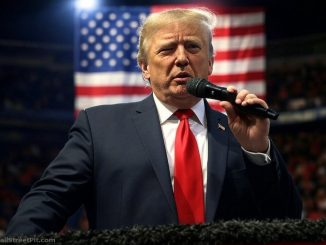- David Kelly, JPMorgan Asset Management’s chief global strategist, warned of a 60% chance of a U.S. recession by spring if Trump’s reciprocal tariffs persist, criticizing them as a regressive tax that hampers global commerce and productivity.
- He attributed the U.S. trade deficit to an overvalued dollar and budget deficits, advocating for a lower dollar and reduced foreign trade barriers over tariffs, which he sees as counterproductive despite Trump’s Midwest-focused rationale.
- Kelly advised investors to anticipate policy shifts, focus on valuations, and diversify, noting that a tariff rollback to 10% could lift markets, though speculative sectors like the ‘Mag Seven’ and crypto remain vulnerable.

David Kelly, chief global strategist at JPMorgan Asset Management, appeared on CNBC’s “Money Movers” and issued a stark warning: if President Trump’s reciprocal tariffs remain in place, there’s at least a 60% chance the U.S. economy will slide into recession by spring. He pointed to the tariffs – pitched by the administration as a revenue engine – as a destructive force, arguing they’re a regressive tax that disproportionately burdens lower-income households and stifles global commerce. Kelly emphasized that the U.S. thrives under free enterprise, echoing conservative icons like Milton Friedman and Ronald Reagan, and questioned why the country would erect trade walls when it excels in open competition.
The discussion pivoted to Trump’s tariff strategy, which Kelly critiqued as misdiagnosing the root of America’s trade deficit. He identified two culprits: an overvalued dollar, propped up for years as a symbol of strength, and a persistent budget deficit that mathematically guarantees more imports than exports. Rather than slapping on tariffs, which he said slow productivity and impoverish nations, Kelly urged the administration to lower the dollar’s value and negotiate down foreign trade barriers—moves he believes the U.S. has the leverage to pull off. He nodded to a potential compromise floated by former Goldman Sachs CEO Lloyd Blankfein: implement a 10% baseline tariff now but delay the reciprocal hikes for six months, a step he called sensible that could avert deeper market damage.
Kelly didn’t shy away from the global fallout, noting Europe’s anger but strategic restraint—retaliating with tariffs, as China has, might only double the economic pain. He dismissed the idea that tariffs address the industrial Midwest’s woes, a key Trump campaign theme, arguing they won’t reverse job losses tied to broader structural shifts. For investors, Kelly offered pragmatic advice: expect policy shifts, as markets and economies can sway even the firmest plans, and focus on valuations. With speculative darlings like the Mag Seven and crypto already faltering, he stressed diversification and sophistication to weather an unpredictable horizon where a bear market, though uncertain in timing, looms as a certainty in over-hyped sectors. The 60% recession odds, he cautioned, hinge on whether these tariffs stick or if Trump reconsiders—a tweet rolling them back to 10% could spark a market rebound, though even that, he warned, isn’t ideal.
WallStreetPit does not provide investment advice. All rights reserved.
- Bulenox: Get 45% to 91% OFF ... Use Discount Code: UNO
- Risk Our Money Not Yours | Get 50% to 90% OFF ... Use Discount Code: MMBVBKSM
Disclaimer: This page contains affiliate links. If you choose to make a purchase after clicking a link, we may receive a commission at no additional cost to you. Thank you for your support!





Leave a Reply